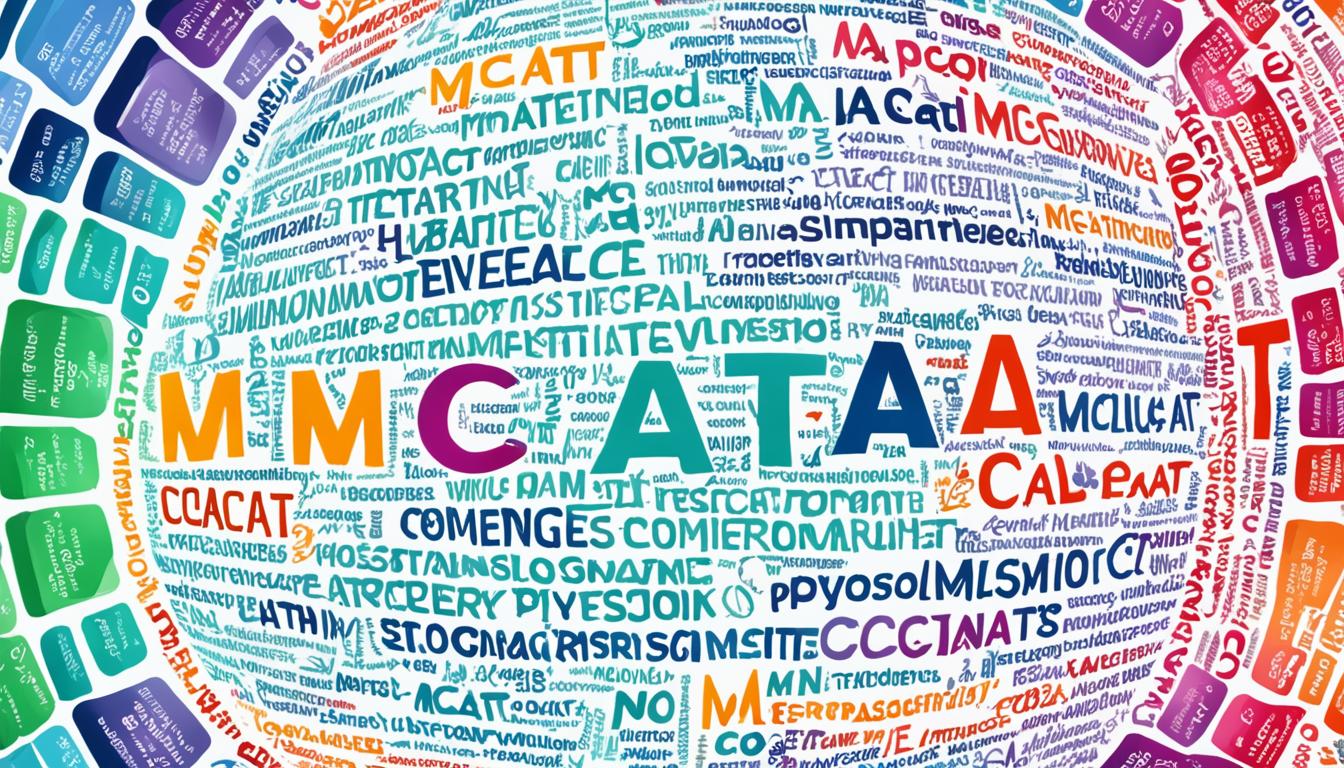MCAT Coverage: Is Physiology a Tested Subject?
When preparing for the MCAT, aspiring medical students often wonder about the specific subjects they must focus on. One concern is whether physiology is on the MCAT.
MCAT Sections Breakdown
The MCAT is divided into four main sections, each with its unique focus, skills required, and time constraints.
1. Biological and Biochemical Foundations of Living Systems (BBLS)
The BBLS section assesses a test-taker’s understanding of fundamental biological and biochemical concepts. This section tests cell biology, genetics, microbiology, biochemistry, and physiology knowledge. Test-takers must apply their knowledge to solve problems and analyze experimental data.
2. Chemical and Physical Foundations of Biological Systems (CPBS)
The CPBS section evaluates a test-taker’s knowledge and application of chemical and physical principles in a biological context. Topics covered include general and organic chemistry, biochemistry, physics, and biophysics. This section requires critical thinking and the ability to solve problems using scientific reasoning.
3. Psychological, Social, and Biological Foundations of Behavior (PSBB)
The PSBB section explores the intersection of biological, psychological, and social factors in explaining human behavior and the practice of medicine. Topics covered include psychology, sociology, biology, research methods, and ethics. This section assesses the test-taker’s ability to apply concepts from various disciplines to scenarios involving human behavior and health.
4. Critical Analysis and Reasoning Skills (CARS)
The CARS section tests a test-taker’s critical thinking and reading comprehension abilities. This section includes passages from various disciplines, including humanities, social sciences, and natural sciences. Test-takers must analyze and evaluate arguments, draw logical conclusions, and comprehend complex written material.
The table below provides a breakdown of each MCAT section, including the time allotted for completion:
| Section | Focus | Time Allotted |
|---|---|---|
| Biological and Biochemical Foundations of Living Systems (BBLS) | Fundamental biology and biochemistry concepts | 95 minutes |
| Chemical and Physical Foundations of Biological Systems (CPBS) | Chemistry and physics principles applied to biology | 95 minutes |
| Psychological, Social, and Biological Foundations of Behavior (PSBB) | Interdisciplinary understanding of human behavior | 95 minutes |
| Critical Analysis and Reasoning Skills (CARS) | Reading comprehension and critical thinking | 90 minutes |
Physiology Content on the MCAT
Physiology content on the MCAT is primarily concentrated within the Biological and Biochemical Foundations of Living Systems section.
To perform well in this section, test-takers must have a solid grasp of physiology, including its principles and applications.
Throughout the Physiology content on the MCAT, students can expect to encounter questions that evaluate their comprehension of vital physiological processes, such as homeostasis, cellular respiration, and the functioning of organ systems.
In this section, the MCAT aims to assess a student’s mastery of core physiological concepts related to overall human health. It tests the ability to analyze and apply knowledge concerning physiological functions, mechanisms, and interrelationships.
🌟 Hey Students! 🚀 Ready for the ultimate experience? Join us on Studentsinside.com's Facebook, YouTube, WhatsApp, and LinkedIn. Click now for tips, fun, and success vibes! 🌈✨ #StudentLife #JoinUs
Test preparation should focus on physiology-specific study materials and resources. Utilizing targeted study guides and practice questions that align with the MCAT’s physiology content ensures that students are adequately prepared to tackle this critical subject area.
Importance of Physiology on the MCAT
To perform well in this section, test-takers must have a solid grasp of physiology topics, including the functions and mechanisms of various body systems. This knowledge will enable them to answer questions that assess their understanding of physiological processes, mechanisms, and regulatory factors.
Moreover, physiology is not confined to the Biological and Biochemical Foundations of Living Systems section alone. It is often integrated with other subjects, such as biology and biochemistry, requiring test-takers to apply their understanding of physiological concepts in a broader context.
Content Breakdown of Physiology on the MCAT
The physiology content on the MCAT covers a range of topics related to the functioning of various body systems. Test-takers can expect questions assessing their understanding of these systems’ physiological processes, mechanisms, and regulatory factors. Some key areas of focus include:
- Cardiovascular System: This topic explores the structure and function of the heart and blood vessels and the regulation of blood pressure and blood flow.
- Respiratory System: Test-takers will encounter questions about lung anatomy, gas exchange, and the control of respiration.
- Gastrointestinal System: Understanding the digestion and absorption of nutrients and the regulation of gastrointestinal processes is crucial for this topic.
- Endocrine System: This area covers the major endocrine glands, their hormones, and their role in maintaining homeostasis.
- Musculoskeletal System: Knowledge of muscle physiology, bone structure, and movement coordination is essential for this topic.
Integration of Physiology with Other MCAT Subjects
Test-takers should be prepared to apply their understanding of physiological concepts in the context of other subject areas during the exam. This integration allows for a comprehensive assessment of medical knowledge and reasoning abilities.
Correlation of Physiology with Biology and Biochemistry
Physiology, biology, and biochemistry are closely related disciplines that provide a foundation for understanding the structure and functions of living organisms.
A deep understanding of biology and biochemistry is essential for comprehending the physiological processes that occur within the human body in the context of the MCAT.
The integration of these subjects allows test-takers to analyze complex biological systems and their underlying biochemical mechanisms.
Application of Physiology in Medical Practice
Physiology forms the basis for medical practice, encompassing normal bodily functions and their regulation. A solid understanding of physiology is essential for diagnosing diseases, determining appropriate treatments, and predicting the effects of medical interventions.
Examples of Integrated Questions
During the MCAT, test-takers may encounter questions that require them to apply their understanding of physiology in conjunction with other subjects. For example:
- How does a specific physiological process relate to the molecular mechanisms involved in biochemistry?
- What role does physiology play in developing certain diseases studied in genetics?
- How does an understanding of physiology contribute to interpreting psychological and behavioral responses?
Integrating physiological concepts with other subjects challenges test-takers to think critically, connect across disciplines, and apply their knowledge to solve complex problems. It reflects the multidimensional nature of medical knowledge and the importance of a holistic understanding of the human body.
| Subject | Integration with Physiology |
|---|---|
| Biology | The Study of physiological systems and their functions, including cellular processes, genetics, and evolution. |
| Biochemistry | The molecular basis of physiological processes, including the role of enzymes, metabolism, and signal transduction. |
| Genetics | The influence of genetic factors on physiological processes and the association between genetic mutations and diseases. |
| Psychology | The impact of physiological processes on psychological and behavioral responses, such as the effect of neurotransmitters on mood and cognition. |
Study Resources for MCAT Physiology
Numerous review books, study guides, and online resources are available that specifically focus on MCAT physiology.
These resources provide in-depth explanations of important topics, practice questions to reinforce understanding, and test-taking strategies tailored to the MCAT. Test-takers are highly recommended to use these resources to enhance their preparation.
Recommended Study Resources for MCAT Physiology:
- Review Books: Several renowned review books cover MCAT physiology comprehensively. These books explain physiological concepts, use diagrams, and include practice questions to reinforce learning. Some popular options include “The Princeton Review MCAT Biology and Biochemistry Review” and “Kaplan MCAT Biology Review.”
- MCAT-Specific Study Guides: Many publishers offer study guides focusing on MCAT physiology. These guides provide targeted information and practice questions that align with the MCAT’s content and format. They often include tips and strategies for answering physiology-related questions effectively. Examples include “MCAT Complete 7-Book Subject Review” by Kaplan and “The Official Guide to the MCAT Exam” by the Association of American Medical Colleges (AAMC).
- Online Resources: Various online platforms and websites offer comprehensive resources for MCAT physiology. These resources often include video lectures, interactive quizzes, and practice passages. Khan Academy, YouTube channels specializing in MCAT preparation, and medical education websites such as Medscape and Lecturio can be valuable sources of free and accessible physiology content.
- MCAT Question Banks: Accessing MCAT question banks that specifically cover physiology topics can be an excellent way to reinforce understanding and gauge preparedness. These question banks include a wide range of physiology-related questions that mimic the format and difficulty level of the MCAT. AAMC offers an official MCAT practice question pack that includes physiology questions, and other online platforms such as UWorld and Next Step Test Prep also provide extensive question banks.
Key Skills Tested in Physiology on the MCAT
Test-takers may encounter questions requiring them to apply their physiological knowledge to novel situations, analyze experimental methods and results, and draw conclusions from graphs or tables.
The exam often presents complex scenarios requiring test-takers to analyze and interpret information, connect different concepts, and draw logical conclusions based on the given data. This emphasizes the importance of honing critical thinking and reasoning skills alongside studying physiology.
One common way critical thinking skills are tested in the physiology section of the MCAT is by applying knowledge to novel situations. Test-takers may be presented with unfamiliar scenarios or experimental setups and required to apply their understanding of physiological principles to solve problems or make predictions. This challenges them to think beyond rote memorization and encourages a deeper comprehension of the underlying concepts.
Data interpretation is another critical skill tested in the physiology section of the MCAT. Test-takers may encounter graphs, tables, or other visual representations of data related to physiological experiments or scenarios.
They are expected to analyze the data, identify trends or patterns, and draw meaningful conclusions based on the information presented. This requires integrating knowledge across different physiological concepts and applying analytical thinking skills to derive insights from the data.
| Key Skills Tested in Physiology on the MCAT |
|---|
| Application of physiological knowledge to novel situations |
| Analysis of experimental methods and results |
| Data interpretation from graphs and tables |
| Critical thinking and reasoning skills |
MCAT Score Importance
The MCAT score holds significant importance in the medical school admissions process. Admissions committees carefully consider MCAT scores as a crucial indicator of a candidate’s ability to succeed academically in medical school and beyond. Aspiring medical students must strive for a strong performance in every section of the MCAT, including physiology.
While the exact breakdown of how much physiology is on the MCAT is not publicly disclosed, it is an integral part of the exam’s content. The Biological and Biochemical Foundations of Living Systems section, which includes physiology questions, represents one of the core sections of the MCAT.
| MCAT Score Importance in Admissions | MCAT Physiology Section |
|---|---|
| A significant indicator of applicant’s ability to succeed in medical school and beyond | Integral part of the Biological and Biochemical Foundations of Living Systems section |
| Demonstrates applicant’s proficiency in tested subjects, including physiology | A comprehensive understanding of foundational concepts in physiology is essential. |
| Reflects critical thinking and problem-solving abilities | Assesses the ability to comprehend and apply physiological principles |
| Enhances chances of securing a seat in a desired medical program | Strong performance in the physiology section is highly valued |
| Preparation and utilization of specific study resources are crucial | A dedicated study of fundamental physiological concepts is essential |
The MCAT as a Test of Critical Thinking
The MCAT is not simply a test of factual knowledge but a comprehensive assessment of a test-taker’s critical thinking and reasoning abilities. In addition to evaluating content knowledge, the MCAT measures the ability to apply scientific concepts, analyze complex information, and draw logical conclusions.
The exam’s inclusion of physiology content provides an opportunity to assess critical thinking skills within the context of biological and biochemical concepts. The questions in the physiology section require test-takers to integrate their understanding of physiological processes with problem-solving and analytical skills.
Benefits of Critical Thinking in Physiology
Demonstrating strong critical thinking skills in the physiology section can positively impact overall performance on the MCAT.
Developing Critical Thinking Skills
Enhancing critical thinking skills requires practice and a solid foundation in physiology knowledge. Test-takers should use active learning strategies such as concept mapping, case-based learning, and problem-solving exercises to strengthen their critical thinking abilities.
Additionally, it is essential to utilize comprehensive study resources that focus on MCAT physiology. These resources should include in-depth explanations of key physiological concepts, practice questions that require critical thinking, and strategies for approaching complex scenarios.
Starting MCAT Preparation
The path to success on the MCAT begins with comprehensive and targeted preparation. Aspiring medical students should start by creating a study plan with dedicated time for reviewing physiology content and practicing related questions. It is advisable to utilize a study guide specifically designed for MCAT physiology to optimize their preparation process.
A study guide focused on MCAT physiology can provide a streamlined approach to studying and understanding the essential concepts in this subject area. It can offer in-depth explanations of key topics, practice questions to reinforce understanding, and valuable test-taking strategies.
FAQ
Is physiology a tested subject on the MCAT?
Yes, physiology is indeed a subject tested on the MCAT. It is in the Biological and Biochemical Foundations of Living Systems section.
What are the main sections of the MCAT?
The main sections of the MCAT are Biological and Biochemical Foundations of Living Systems (BBLS), Chemical and Physical Foundations of Biological Systems (CPBS), Psychological, Social, and Biological Foundations of Behavior (PSBB), and Critical Analysis and Reasoning Skills (CARS).
Where can I find physiology content on the MCAT?
Physiology content is primarily found in the Biological and Biochemical Foundations of Living Systems section of the MCAT.
Why is physiology essential on the MCAT?
Physiology is a crucial subject on the MCAT as it covers essential concepts related to normal functioning and homeostasis in the human body.
What topics does physiology cover on the MCAT?
The MCAT’s physiology content covers a range of topics related to the functioning of various body systems, such as the cardiovascular, respiratory, gastrointestinal, endocrine, and musculoskeletal systems.
How is physiology integrated with other subjects on the MCAT?
Physiology is often intertwined with other subjects, such as biology and biochemistry, on the MCAT. Test-takers should be prepared to apply their understanding of physiological concepts in the context of different subject areas during the exam.
Are there study resources available for MCAT physiology?
Yes, numerous review books, study guides, and online resources are available that specifically focus on MCAT physiology. These resources provide in-depth explanations of important topics, practice questions, and test-taking strategies tailored to the MCAT.
What skills are tested in the physiology section of the MCAT?
In addition to testing knowledge and understanding of physiology concepts, the MCAT also assesses critical thinking and reasoning skills about physiology. Test-takers may encounter questions requiring them to apply their physiological knowledge to novel situations, analyze experimental methods and results, and draw conclusions from graphs or tables.
How important is the MCAT score?
The MCAT score plays a significant role in the medical school admissions process. Admissions committees consider MCAT scores to indicate a candidate’s ability to succeed in medical school and beyond.
Is the MCAT just a test of factual knowledge?
No, the MCAT is not simply a test of factual knowledge but also a test-taker’s critical thinking and reasoning abilities. This includes applying scientific concepts, analyzing complex information, and drawing logical conclusions.
How should I start my MCAT preparation?
To effectively prepare for the physiology content on the MCAT, it is crucial to utilize reliable study resources and create a study plan that includes dedicated time for reviewing physiology content and practicing related questions.








